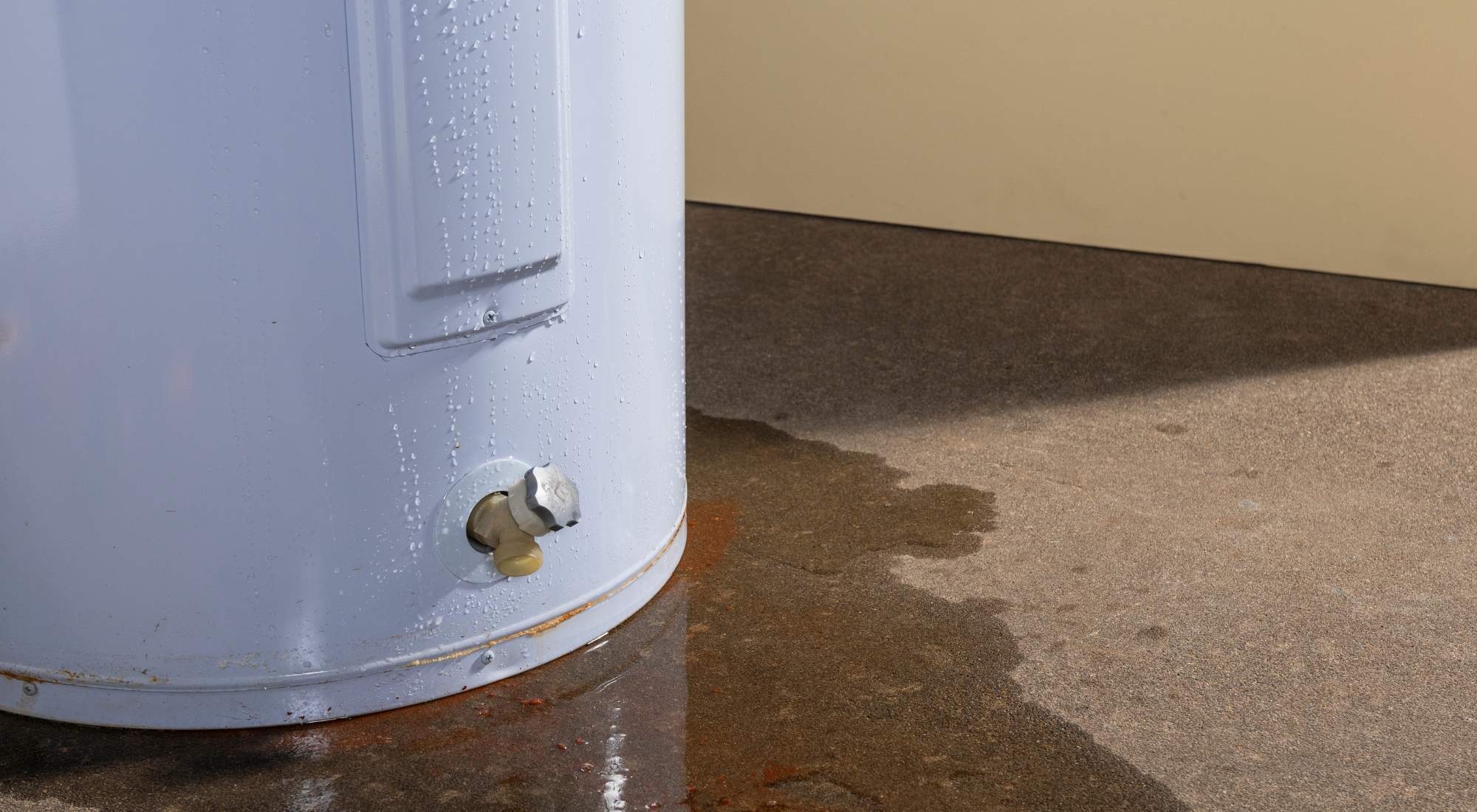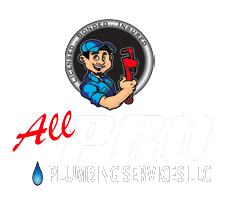Leaking Water Heater — Friend or Foe? Potential Dangers and Practical Solutions

Your water heater is leaking, and you think — yet another thing to add to the to-do list. You know that having hot water is important in your home, but how dangerous is the leak?
Depending on the cause, your leak could become a bigger problem if left unrepaired.
Below, we will provide you with the potential dangers of a leaking water heater, signs to look for, and possible causes. Keep reading to learn more about the importance of quickly repairing or replacing your water heater, ensuring the safety of your family and your home.
Table of Contents
- Is a Leaking Water Heater Dangerous?
- Potential Risks That Make a Leaking Water Heater Dangerous
- Signs That Your Water Heater Is Leaking
- Possible Causes of Water Heater Leaks, Depending on the Source of the Leak
- What Should You Do if You Notice a Leak Around Your Water Heater?
- If You Have a Leaking Water Heater, Call the Team at All Pro Plumbing To Keep Your Family Safe and Dry
Is a Leaking Water Heater Dangerous?
If you’ve noticed a leak, you may be wondering — is a leaking water heater dangerous? The bottom line is yes, it can be dangerous. Not knowing the cause of the leak is a concern that needs to be addressed. Leaks can occur due to various issues with the water heater, and the potential risks should prompt you to call a professional to find and fix the problem right away.
The experts at All Pro Plumbing are quick to respond and will schedule your service as soon as possible. As a veteran-owned and family-run business, we know the importance of safety in your home. Finding the cause and repairing or replacing your water heater is our priority.
Give us a call to get started today.
Potential Risks That Make a Leaking Water Heater Dangerous
The risk of danger with a leaking water heater depends on its cause and severity. Even if the risk of danger is minimal, it’s always safest to get leaks checked out sooner rather than later.
Flooding
A flood can cause significant damage to your home’s flooring and drywall. As reported by the EPA, mold can begin growing in as little as 24 to 48 hours.
A water heater that leaks even a small amount can saturate the floor and drywall, creating the perfect environment for mold growth. If left unrepaired, the risk of flooding can increase. The underlying problem can exacerbate the leak, or worse, cause a burst.
The ideal next step is to respond quickly and call in a professional to take care of the problem before water damage and mold can occur.
If you already have standing water in your home, be sure to address it as soon as possible. If only a small amount of water was released, use a mop or a wet/dry vacuum until the water is cleaned up. If the leak is more extensive, call All Pro Plumbing for help to prevent further damage to your space.
Gas Leak
Although uncommon, a leaking water heater can pose a potential risk of a gas leak. A gas leak is hazardous and requires immediate attention.
Shut off the gas, evacuate, and call 911 or your gas company if you:
- Smell a gas leak (rotten eggs or sulfur smell)
- Hear a hissing or whistling sound near the gas pipes or valves
- Notice the pilot light flickering or refusing to stay lit
- See yellow or orange burner flames instead of blue
- Have any of these symptoms when you’re near the water heater:
- Nausea
- Headache
- Dizziness
- Fatigue
Scalding
If you see a leak coming directly from your water heater’s tank, it’s best to use caution and assume that the temperature of the water is extremely hot.
If you come in contact with the water, it can cause second-degree burns on the skin within seconds. Avoid unnecessary risks and keep yourself, kids, and pets away from leaking water heaters.
Explosion
Risks of leaking water heater explosions are rare, but not impossible. Due to pressure build-up caused by a faulty or damaged temperature and pressure valve, an explosion is possible. To keep your water heater operating safely, water pressure should stay between 50 and 100 psi.
Warning signs of a possible explosion include:
- Popping or rumbling sounds
- Gas leak indicators
- Leaking pressure valve
If any of these signs occur and you suspect your water heater may burst, shut off the water and gas lines immediately and call 911.

Signs That Your Water Heater Is Leaking
It’s good to learn the signs of a leaking water heater and the ability to distinguish which ones are more serious than others.
Key warning signs:
- Loss of hot water can occur if there is less water in the tank due to a leak.
- Reduced pressure inside the unit can cause a drop in water pressure throughout your home.
- Visible water collecting around your unit can cause home damage and mold.
- Rust or corrosion can point to an internal leak. This may be an indicator that your unit needs to be replaced.
- Hissing sounds can indicate a leak that is dripping on a hot surface or a potentially more dangerous cause — a gas leak.
Possible Causes of Water Heater Leaks, Depending on the Source of the Leak
Leaks can occur on the top or bottom of the water heater. The Insurance Institute for Business & Home Safety states that 69% of water heater failures are due to slow leaks or sudden bursts. Determining where the leak is coming from is a huge help in understanding what the potential dangers may be.
Leaks From the Bottom
Problems With the Drainage Valve
If the drainage valve is leaking, it may be worn, damaged, or improperly installed. Fixing the valve properly is important in preventing further leaking, water damage, and mold from moisture or standing water.
Possible causes of a leaky drainage valve:
- Normal wear
- Loose valve
- Sediment build-up
- Internal or external corrosion
Drainage valve issues can increase the risk of excessive build-up and a bursting tank. Be sure to keep up with regular maintenance in order to prevent this from happening.
Our All Pro Plumbing experts can help with preventative maintenance as well as repairing or replacing your unit when necessary. Give us a call to schedule the service you need.
Sediment Buildup in the Tank
The primary job of a drainage valve is to drain and remove the buildup of minerals and debris at the bottom of the tank. If you neglect regular maintenance, the accumulation can clog the system or cause a malfunction, such as a leak. According to a study, nearly 75% of water heaters fail before they are 12 years old, frequently as a result of corrosion and sediment buildup in the tank.
Regularly flushing sediment will keep your water heater working efficiently, help prevent leaks from the drainage valve, and extend its lifespan. It’s recommended to flush your unit at least once a year.
Condensation Buildup
You’ve seen condensation on a cold glass of water on a hot day; this same process can occur with your water heater. Condensation happens when warm or hot air meets a cold surface.
If you notice water on or under your tank, first try wiping it off and waiting to see if it’s condensation. If the problem persists, it’s most likely a leak that requires further examination and possible repair.
Leaks From the Top
A Leak Above the Ceiling
If you notice water pooling around or near your water heater, first check above its location to see if there is a leak coming from the ceiling. You could have a leak that is separate from your unit. Possible causes of water from your ceiling could be a leaking or burst pipe or roof damage.
A Leaking or Damaged T&P Valve
The temperature and pressure valve’s function is to release pressure when it exceeds normal levels to prevent damage. If the T&P valve is not working properly, the buildup of pressure can cause your water heater to burst. A bursting tank can not only cause damage to your home but can also be a huge safety hazard to your family.
A Leaking Cold Water Inlet Valve
If you are experiencing a leak from the cold water inlet valve, it could be as simple as a loose fit. When tightening doesn’t fix the issue, you may have a leaking pipe bringing water into the water heater. If this is the case, call a licensed plumber to replace or fix your pipes.

What Should You Do if You Notice a Leak Around Your Water Heater?
There are a few simple fixes a homeowner can do if they notice their water heater is leaking. If you’re comfortable doing so, examine your unit to see if any of the following problems can be solved.
Fixes to try before calling a licensed plumber:
- Make sure all connections are tightly fitted.
- If the leak is coming from the pressure relief valve, adjust the pressure settings.
- Check to make sure the drain valve is fully closed.
- Check the age of your unit — it’s recommended that you replace your water heater every 8 to 12 years for conventional tanks, while tankless heaters can last up to 20 years.
The leak can be a small problem or one that can escalate, causing damage to your home and an unsafe environment for your family. Make sure to keep the area around your water heater dry to prevent mold growth. If you are unsure of the source or have a severe leak, it’s time to call a professional to diagnose and resolve the issue.
If You Have a Leaking Water Heater, Call the Team at All Pro Plumbing To Keep Your Family Safe and Dry
Maintaining a home is an ongoing effort, and when something goes wrong, it can be a major headache.
If you find yourself with a leaking water heater, our experts at All Pro Plumbing are professionals you can count on. With over 20 years of experience, our team has the skill and insight to provide reliable solutions and peace of mind.
Are you in need of water heater replacement or installation services? Contact us to get a quick quote or to schedule an appointment today!


